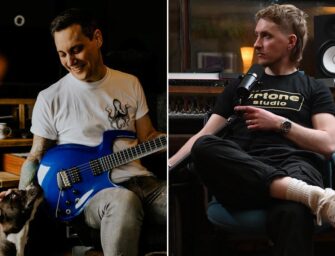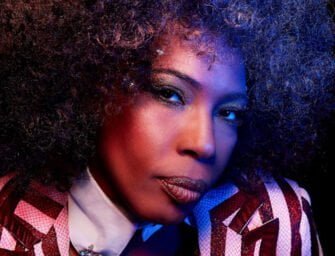
Jessie Jo Dillon: “My biggest dream is to be in the Country Music Hall of Fame.”
ACM’s Songwriter of the Year on her reluctant beginnings and writing for some of the biggest names in the business
Listen to any of the major releases coming out of country music and you’re likely to hear a Jessie Jo Dillon cut. Kelsea Ballerini, Jelly Roll, Miranda Lambert, Megan Moroney, and Post Malone are just a handful of the biggest names to have recently benefited from the reigning Academy of Country Music (ACM) Songwriter of the Year’s magic touch. It’s quite the hot streak for the native Nashville songwriter, one that has seen her achieve major commercial success, including a much coveted Triple Play award.
The daughter of country artist and songwriter Dean Dillon, if we were to list all of her notable credits we’d have no room for the actual interview. That said, with a career stretching back to the late 00s, some of the key writes in her career include The Breath You Take (George Strait), Girl Next Door (Brandy Clark), 10,000 Hours (Dan + Shay), Memory Lane (Old Dominion) and Lies Lies Lies (Morgan Wallen).
We recently had the pleasure of chatting with Dillon about her career. From her start in the business all the way to her current spot at the pinnacle of the Nashville songwriting community, it’s been one hell of a journey…
Jessie Jo Dillon features in our Nashville Special issue
What an incredible year you’ve had!
“So wild, actually, my ACM award came in the mail recently. I was having one of those days… I’m kind of burnt out right now, and so I went to write and I was struggling to attach to anything we were doing. I was driving home and was in a bad mood about it and then I got home and there was this big box that was really heavy. I was like, ‘What is in this?’ It was the award and I was like, ‘Oh, everything’s okay.’
It’s nice to speak to a Nashville songwriter who was born and raised in Nashville…
“I didn’t used to think it was so rare. There’s a couple of us: Ernest, who does a lot of stuff with Morgan [Wallen], and Conner Smith, he’s an artist/writer. He’s from here. I’m trying to think of who else… Lauren Hungate… there’s a couple of us, but not very many.
“I didn’t use to notice that, but so many people are moving here now that it’s becoming like LA where it’s crazy if somebody’s actually from LA. I’ve started to feel like that about it, because all of LA is moving here now.
“I have mixed feelings about it, honestly, because the Nashville community and music is very special. I want to protect our ecosystem, because people in LA, whether they want to admit it or not, do things very differently. I’m definitely protective of the way we do things here.”
That’s an ecosystem that you were born into, did you ever battle against being a musician and a songwriter, or did you always embrace it?
“I had a horrible battle against it. I always was writing, but I kept it to myself. I had an English teacher in high school that was really supportive of me. I would share things with him, songs or things I had written, or with my two little brothers, they’re twins.
“But my dad obviously is an amazing songwriter in the Hall of Fame [both Nashville Songwriters Hall of Fame and Country Music Hall of Fame], and I just felt weird about it. I wanted to do something different if I could. I tried to force myself … I thought, ‘Well, maybe I can be a journalist, or something else that still involves writing,’ but at the end of the day, I think songwriting is what I was supposed to do. I had to embrace it, even though I was scared to do that.
“Then my dad was funny because he was almost irritated with me when I came to him about it, because he was like, ‘Why haven’t you been telling me about this?’ I was like, ‘I don’t know.’”
Was there one moment where you thought, ‘Okay, I am going to pursue this properly?’
“I moved to LA when I was 18, which I’m grateful for. I was working a job, and I could do it remotely, and I just wanted to move away from home. I was only there a year, but I made friends with this lady, through a different friend, that was a publisher at Sony out there. Her name is Kathleen [Carey], and I started going and playing her songs, and she would give me feedback.
“Then one day, she turns one of my little work tapes off and she was like, ‘Go home!’ And I was like, ‘Damn Kathleen, that’s pretty savage.’ And she said, ‘No, you can do this. But you write country music. I don’t care who your dad is or what your story is, you need to go home and really try to do this.’ So then, within a couple of months, I did move home.
“I wonder where she is all the time. I need to find her because she probably has no idea what an impact she had. Because I really needed that, somebody outside of my orbit to tell me, ‘Hey, you can really do this.’”
I always feel like my strength in a room is getting to the heart of the matter
Was it a long road from that point, or did things happen quite quickly?
“I’ve had a weird road… Someone asked me on the ACM carpet, ‘Looking back, would you change anything?’ and I almost started to cry, because it was a lot. I moved home. I got set up with BMI, and Clay Bradley was there at the time, who’s back again now, and he helped me look for different deals.
“I started writing with a boyfriend I had at the time, and different other friends. Then I did start writing with my dad. He was like, ‘You should come and we should try to do that together.’ We did write a song that George Strait liked and recorded called The Breath You Take, and it ended up being a hit, and it helped me get a publishing deal – but I had already been in talks with that company with other songs and stuff.
“People say it’s a “10-year town,” I do think that’s true. I think the town makes you pay, whether it’s at the beginning, or in the middle, or at the end. I came out the gate with that song, but then it was many years of failed singles, bad publishing deals, that kind of stuff. It was a grind, for sure, but I wouldn’t trade any of it. My first deal, I met Shane McAnally and Brandy Clark, and I have them to thank really, for taking me under their wing. I learned so much from them about writing.”
What was it about them?
“Shane, I loved his music. Whether it was recorded by somebody or not, I just felt lucky to be in the room with him; the way he would write a song, or the way he saw the world, and then Brandy too. It’s funny, now everybody’s a big deal and they’re like my older brother and sister, but at the time they were grinding just like everybody else in town. It’s so crazy how it all has played out.”
Were there particular songs that signposted the way for you, where you felt like the grind was going to be worth it?
“When Brandy started making records, I really felt like… me, her, and Shane, and then me and her, have always had such a special thing. So it was helpful with songs like Crazy Women [LeAnn Rimes] or Girl Next Door. I’d had some things on Rodney Atkins and Craig Morgan. It was all singles that ended up like dying. But I really feel like when me, Chase [McGill], and Jon [Nite] had Break Up In The End that Cole Swindell did, that was a big moment for me.
“I remember when we wrote that song, I loved it so much, but my first thought was, ‘No one’s ever going to record this, it’s too slow.’ It was wild because, within a day, multiple people wanted the song. I remember thinking, ‘Okay, you’re on some kind of a right path.’ It was shocking to me. We were still in the middle of Bro-country, and that song felt very different than what was popular at the time. It felt more traditional I guess, just a good country song.”
Is that where your strengths were at that point?
“I always feel like my strength in a room is getting to the heart of the matter. You know, whether it’s a tempo or whatever, none of that really has anything to do with it. The older I get, I realise that I’m always trying to mine for something real. My dad taught it to me early on, ‘If it’s real to you, it’s going to be real to someone else.’
“When you do this every day, or a lot of days, it’s easy for that to get lost. It can become robotic. I don’t want to knock the people that work that way, because that’s their process – a song is like a math problem to them – but to me, that’s not inspiring. Their way is their way, but for me, I want to write real music for real people.”
Is it a case of having something you want to talk about before you go into the write or being open and comfortable with the people you’re writing with, and that then sparks an idea?
“I think it’s both, it depends on the day. For instance, the past several months, I’ve been working with a smaller group of writers for the new Morgan Wallen album, the four of us that wrote Lies, Lies, Lies [written with Daniel Ross, Josh Miller, Chris Tompkins].
“That was a special day, and that is a good example of… someone came in with something that was on their mind, and then it’s like method acting. You can feel something in the room, but it’s not necessarily what you’re going through.
“A lot of the other songs that Morgan has liked came from a really real place, for me or one of my co-writers. It’s been a lucky and special time and I’m so proud of a lot of the songs. I think it’s some of the best work I’ve ever done, and it has connected with an artist of that calibre. It’s coming from an authentic place for somebody that day, whether they’re in that heartbreak spot, or I-just-met-somebody’s spot, and then everybody else draws from within their own well.”
Can you describe how you turn those subject matters into songs?
“I think of something like Girl In The Mirror that I co-wrote with Megan Moroney and Matt Jenkins. It was the first day I’d even ever met Megan. My publisher had played me some of her music, and I loved it, and I wanted to get with her immediately. I loved her voice and her perspective, and how country she is. When we sat down, we liked each other immediately and she had that idea of the girl in the mirror.
“It was funny, the more we were talking about it, how much of that ended up going in this song. Both of us are pretty strong women – we set our minds on something and we have big dreams – and we had both been in relationships with guys that we felt, in order to “keep them,” we needed to make ourselves smaller. That never ends up working out, for them or for us. So you talk about it, and obviously you’re rhyming and things like that, and you can get stuck and everything, but it is coming from a real thing for somebody, or for multiple people in the room.”

Jessie Jo Dillon: “I want to write real music for real people.”
Another common theme we picked up from our time in Nashville is that you can’t be afraid to say something stupid, because it might trigger san idea in someone else…
“Oh, 100 percent. My dad has a great story about The Chair, one of his biggest George Strait songs. He was on a boat with Hank Cochran, they wrote that together, and he said, ‘Hank came around the corner and said those lines, “Well, thank you, could I drink you a buy?/Oh listen to me, what I mean is, can I buy you a drink?”’ That’s the sickest line because it’s so real of a drunk person. And dad was like, ‘That is either the dumbest thing I have ever heard or the most brilliant. And I’m gonna go with brilliant,’
“And then Louis Bell, Post Malone’s genius producer… me, my dad, and Post actually got to write a few months ago, which was very cool. I asked Louis one day, ‘How have you guys done some of these songs?’ because they’re such global, massive hits. And similarly, Louis was like, ‘What is crazy is that certain songs kind of started out as a joke. We came up with a joke-seeming melody, then later, we would be like, “Wait a minute, is that actually awesome?”’ There’s such beauty in that dare-to-suck mentality, being silly even if the song is serious.”
Even now, with all your experience and success, do you still find that co-writing gets more out of you than if you’re going to try to do it on your own?
“I think it really depends, because some of my favourite songs of all time were written by one person. I’m a huge Brooks & Dunn fan, and they’ve become like family to me. I was at a birthday dinner and Kix and Ronnie were there. Ronnie has written so many songs by himself that I just worship.
“A lot of times, myself included, you can kind of start something by yourself, and then you bring it to your co-writer. But there are those times that you sit there and think, ‘I need to see this through on my own.’ Sometimes, when I’ve written by myself, because we get so used to co-writing, I’ll pretend that my co-writers are there. I’ll ask about a line, or, you know, ‘Should I put a flat seven here?’ and that can help me. Again, the North Star always being something true.
“I love how Hemingway says, ‘Write anything, but just make it true. Think of one true thing [sic]’ I try to, on my best days anyways. Of course, you’re gonna have days when you’re not remembering to do this, and you’re in a bad mood, but you show up anyway. There are times that I love co-writing because I feel like you’re capturing the human experience, getting to hear other perspectives on one thing. But then I do think that sometimes your own point of view is the way.”
I think we’re all our own worst critic. I’m really hard on myself about things
We have to return to the fact that you are the current ACM Songwriter of the Year…
“It’s so crazy. I still can’t really believe it.”
Do you feel like the industry caught up with you or that you had a particularly good year?
“Maybe a mix of both. I don’t know. That’s a cool thing to say, ‘The industry caught up with you.’ I would like to think that I did really good work the past year and this year. It’s some of my favourite work I’ve ever done. I worked so hard the past couple of years, harder than I’ve ever worked.
“My publisher called me yesterday, and he was like, ‘You’ve got to take time off,’ because I am starting to hit a wall. I can feel it a little bit, but I’ve never been very good at figuring that out; some people are dialled into their rhythm of when to take a break.”
Is that because you don’t want to turn down work in case it suddenly dries up?
“Exactly, and I don’t think that feeling ever goes away for anyone. Even after winning this, I still will leave a write sometimes and I’m like, ‘Dude, you were not good today.’ Even if that’s not true, I still get nervous about everything. I think we’re all our own worst critic. I’m really hard on myself about things. I’m looking at the award right now and I still can’t believe it. It was so awesome and it’s so surreal.
“There is a bit of imposter syndrome and there is still a part of me that’s like, ‘Me? Really?’ Because you work so hard for so long, and you always have the dream. That also is something important, that I’ve always had the dream that this would happen to me. Even when it feels like this tiny little fire has almost burned out inside of you, and you don’t really believe you’ll ever get there, there has to be some part of you that thinks, ‘Maybe I can.’ I always want to tell young writers that. I’m like, ‘Even if other people think it’s ridiculous, you have to believe in yourself.’ It’s not arrogance, it’s this weird belief.”
As if you have to be the one who manifests it for yourself?
“You really do. I think there’s something to that, even on your darkest days. I’ve had so many days that I’m like, ‘I’m quitting,’ but you don’t really mean it. It’s a tough business, even though we’re all lucky and nobody’s doing hard labour: it’s really hard on your heart and your self esteem, and it’s highly competitive. There’s so much music in the world, there’s so many artists, there’s so many writers…
“It used to be a harder thing to do, and now you can be at home and do an Instagram video, or TikTok. It used to be a lot harder to get in the gate; it’s more competitive than it’s ever been, and it’s so easy to get lost in that.
“But I do feel, back to the award conversation, the past two years… I had been with a boyfriend for a long time and we went through a really earth-shattering breakup. I remember one day waking up and being like, ‘You know what? Dude, you’re gonna throw yourself into work and you’re going to put blinders on and don’t even get caught up in any of it. Just look ahead and keep doing what you know how to do and writing how you know how to write.’ And here we are.”
And then as a by-product of being Songwriter of the Year, I’m guessing you’re more in demand than ever? You said you’re a little bit burnt out, are you having to say no more than before?
“I definitely feel overwhelmed by that sometimes. Different people have reached out to me, especially in other genres, and that can be a little overwhelming to me. I talk to Lainey [Wilson] about this sometimes, because she has 10,000 times more and we’ve bonded over it. Our problem is saying no. I keep saying yes to almost everything. But you know, it’s music, I want to keep making it and it’s my main focus. And as long as I don’t completely lose my breath in this race, I want to keep writing songs.”
What is the next big thing that you’re hoping to achieve?
“At the end of it all, my biggest dream is to be in the Country Music Hall of Fame. My dad got inducted into that in 2020, during COVID. It’s really hard to do, especially as a writer, because writers don’t get inducted every year. I think that is my biggest dream. And then, a closer dream, I would love to be BMI Songwriter of the Year, because that’s really hard to do.
“I’ve always felt lucky that, especially right now… being able to have a hit, and then also be involved in music that’s more critically acclaimed. Because sometimes those things are not the same thing. I’ve always been that kind of a person; I’ve always felt like a bunch of people all in one person. F. Scott Fitzgerald actually has a quote about that, ‘Writers aren’t exactly people. They’re a whole bunch of people trying to be one person.’
“Some of the things that have happened this year are things I never thought would happen to me. For instance, we have a thing here called the Triple Play, and that’s where you have three No. 1 songs in a calendar year. That is something I never thought I’d do.”
What were the three songs?
“It was Memory Lane by Old Dominion, Back Then Right Now by Tyler Hubbard, and Halfway To Hell by Jelly Roll. That was a dream I was scared to let myself dream, because I wasn’t sure if I was the kind of writer that could pull out those kind of numbers in a year. Jelly Roll, I love him so much, so it was so fitting that our song was my third.”
Is that an addictive feeling?
“There were times when I was younger that I would look at writers older than me, I don’t know if jealous is the word, but I’d be like, ‘Man, their career is crazy,’ and I used to think with some people, ‘Gosh, is enough ever enough?’ And I think the answer is no. I think everybody wants to keep creating and then they you do start thinking, ‘I hope they single that,’ or whatever, especially if you’re really proud of it.”
What would you say is the one song by someone else that you wish you could have written?
“Oh man, Desperado by the Eagles. There is just something about that song, I could almost cry talking about it, I just relate to it. I’m such an emotional person. Don is definitely one of my favourite writers of all time. The way he says things and his voice, I don’t know, I do love that song. I wish I had written it for sure.”
Lastly, if you could write a song for anyone, living or dead, who would it be?
“Oh, wow. I’d actually want to write with them. I have three people: Bruce Springsteen, The Rolling Stones, and the Eagles. And honestly, I would also love for Hank Williams to come back as a ghost and be able to write a song with him.”
There’s a song in that…
“I was actually talking to someone about this the other day. I love songs about Hank Sr. I love that Alan Jackson song Midnight In Montgomery about going to his grave, and I love the David Allen Coe song The Ride. There’s such good advice for any songwriter in that.
There’s power in those who came before us, I just wish we could get their ghosts to come out sometimes.”




































Related Articles